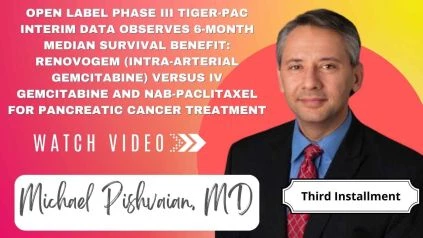Open Label Phase III TIGeR-PaC Interim Data Observes 6-Month Median Survival Benefit: RenovoGem (Intra-Arterial Gemcitabine) Versus IV Gemcitabine and nab-paclitaxel for Pancreatic Cancer Treatment
By Michael Pishvaian, MD, PhD
With positive outcomes, do you see any other tumor types where RenovoGem should be studied and could potentially make an impact?
The other thing that’s interesting is that if this study proves positive, ultimately, it really will affirm the idea that delivering local therapy to a tumor can enhance the overall survival for patients even while they’re receiving integrated systemic therapy. And we’ve seen this in other cancer types, with for example, colon cancer and other cancers. But certainly, this would op,en the door up to other cancers that perhaps couldn’t have been resected, including things like gallbladder cancers, or bile duct cancers and even lung cancers, there may be means to try and get this catheter around the appropriate artery that will enhance delivery of the chemotherapy to those tumors. So I think it really just opens the doors considerably to other tumor types that might be considered.
Michael Pishvaian, MD, PhD – About the Author, Credentials, and Affiliations
Michael Pishvaian, MD: A Renowned Oncologist and Researcher in Precision Medicine for Pancreatic and Colorectal Cancer Treatment
Dr. Pishvaian is an Associate Professor at the NCR Kimmel Cancer Center at Sibley Memorial Hospital and Director of the Gastrointestinal, Developmental Therapeutics, and Clinical Research Programs at the Johns Hopkins University School of Medicine. Prior to his current position, he held a similar role at the University of Texas, MD Anderson Cancer Center, where he was also Co-director for Clinical Research at the Sheikh Ahmed Bin Zayed Al Nahyan Center for Pancreatic Cancer Research. Dr. Pishvaian earned his MD and PhD in Tumor Biology from Georgetown in 2001, where he also completed his medical residency and fellowship in Hematology/Oncology. His research focuses on precision medicine for patients with pancreatic and refractory colorectal cancer, with a particular emphasis on targeted therapy for homologous recombination DNA repair deficient tumors. Dr. Pishvaian is also a co-investigator on an NIH RO1 studying resistance mechanisms to PARP inhibitor-based therapy.

